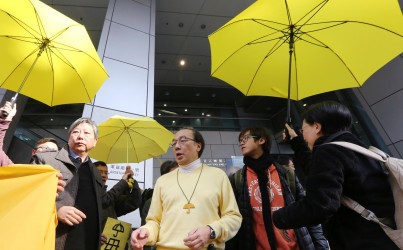Occupy Central
Occupy Central is a civil disobedience movement which began in Hong Kong on September 28, 2014. It calls on thousands of protesters to block roads and paralyse Hong Kong's financial district if the Beijing and Hong Kong governments do not agree to implement universal suffrage for the chief executive election in 2017 and the Legislative Council elections in 2020 according to "international standards." The movement was initiated by Benny Tai Yiu-ting (戴耀廷), an associate professor of law at the University of Hong Kong, in January 2013.
Umbrella Movement
The Umbrella Movement (Chinese: 雨傘運動; pinyin: yǔsǎn yùndòng) is a loose political movement that was created spontaneously during the Hong Kong protests of 2014. Its name derives from the recognition of the umbrella as a symbol of defiance and resistance against the Hong Kong government, and the united grass-roots objection to the decision of the Standing Committee of the National People's Congress (NPCSC) of 31 August.
The movement consists of individuals numbering in the tens of thousands who participated in the protests that began on 28 September 2014, although Scholarism, the Hong Kong Federation of Students, Occupy Central with Love and Peace, groups are principally driving the demands for the rescission of the NPCSC decision.
The movement consists of individuals numbering in the tens of thousands who participated in the protests that began on 28 September 2014, although Scholarism, the Hong Kong Federation of Students, Occupy Central with Love and Peace, groups are principally driving the demands for the rescission of the NPCSC decision.
POST OCCUPY CENTRAL - DAY 33:
Full coverage of the day’s events
Two writs allege police violence during Mong Kok Occupy clearance
Two pedestrians have filed the city's first two writs complaining of police violence in the aftermath of the force's clearance of the Occupy site in Mong Kok in late November.
Beijing will not allow blank vote: Cheng Yiu-tong
A local delegate to the National People's Congress, Cheng Yiu-tong, said he believes Beijing will not accept a so-called "blank votes proposal" which will allow voters to declare a Chief Executive election void.
He made the remarks in Shenzhen ahead of a meeting with a senior mainland official, Li Fei.
Cheng said the political framework set out by Beijing in August had to be taken word by word.
He said Beijing would not change its mind, no matter how much noise Hong Kong people make about the issue.
CY trades barbs with democrats over free speech
Chief Executive Leung Chun-ying was yesterday embroiled in a war of words with pan-democrats during which he was accused of trying to emulate Mao Zedong by starting a new Cultural Revolution.
At an eventful question-and-answer session during which four lawmakers were ejected from the Legislative Council chamber, the Labour Party's Lee Cheuk-yan said Leung was "a killer of universal suffrage" and free speech for using his policy address to attack the University of Hong Kong student publication Undergrad and its book Hong Kong Nationalism, which advocates self-determination and independence.
"The people of Hong Kong are really having bad luck to have this universal suffrage killer, `689,' as the chief executive ... he is power hungry, he evaded paying tax for HK$50 million and what is most terrifying is that he looks like Mao Zedong. He looks like he wants to start a Cultural Revolution," Lee said.
"If he is fond of political struggles he should step down and go to the mainland."
With a wry smile, Leung dubbed "689" from the number of votes he got from the Election Committee fired back during the shouting match and flipped Lee's words against him.
"If Lee wants to test my power under annex one of the Basic Law ... I would urge Lee to vote in favor of the proposal [on political reform] ... if Lee vetoes the proposal, then he is the real killer of universal suffrage," he said.
"We are in a place with freedom of speech. Everyone is free to make their own statements. This is not a political struggle."
However, Leung refused to confirm if he personally wrote the introduction and conclusion of his policy address and reiterated it was a "collective effort" from his team.
Civic Party lawmaker Alan Leong Kah-kit described the policy address as a "manifesto for political struggle."
Leong added: "Hardly have I ever seen an attempt like this in a policy address. This otherwise unknown book Hong Kong Nationalism is out of print.
"This is not a subject for Hong Kong. Nobody is trying to pursue independence ... Is he so fearful he had to single out the HKU body in the policy address?
"Is there any freedom of speech and freedom of expression? Why is he reacting so strongly to articles written by the students?"
Freedom of expression is a "core value" of Hong Kong, Leung replied, and "everybody can take part in discussion."
He said: "There are some young students who spoke of self-determination, forming an army and nationalism and so on. I think Leong should state if he supports these sort of ideas."
Leong fired back: "If CY Leung's interpretation of this book Hong Kong Nationalism is that Hong Kong is trying to seek independence, then I can say I would be against it."
The four lawmakers ejected included "Long Hair" Leung Kwok-hung, who threw red bean buns at Leung. He smiled as "Long Hair" was wrestled out of the chamber by five security guards.

沒有留言:
張貼留言